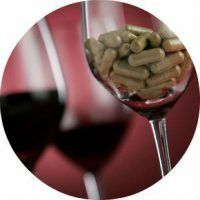
When prescribing a course of antibacterial therapy, patients are often interested in whether it is possible to drink alcohol at this time. Alcohol has a direct effect on the activity of antibiotics and the process of their absorption, preventing the absorption of the drug from the digestive tract and causing a number of unpleasant consequences.
- Why
- can not be combined
- Intoxication of the body
- Liver load
- Medication reduction
- Allergy
- When it is possible to drink alcohol after
Why it is impossible to combine
Simultaneous use of alcohol and antibiotics can lead to extremely negative effects and consequences:
to the table of contents ^Intoxication of the body
Once in the human digestive tract, alcohol is slowly oxidized to acetaldehyde, and then split into water and carbon dioxide. The faster the reaction, the less will be affected by the negative effects of aldehyde on the body. The antibiotic slows the conversion of alcohol into non-toxic components, thereby contributing to its accumulation in the blood and causing intoxication, the symptoms of which can be:
- Nausea and vomiting.
- Severe headache.
- Pressure jumps.
- Feeling of heat, redness of neck, face, chest.
- Rapid heart rate, shortness of breath.
- Cramps of the extremities.
- Feeling of fear.
- Loss of consciousness.
- Lethal outcome.
Incompatible with alcohol preparations are:
- Ketoconazole is an antifungal agent found in the Livarol suppositories.
- Co-trimoxazole is a combined broad-spectrum drug.
- Levomycetin - is prescribed for infections of the bile ducts, urinary tract.
- Metronidazole - a popular antibiotic, is also produced under such brands as Clion, Metrogil, Metroksan, Rosamet.
- Moxalactam - used in severe conditions, when there is a suspicion of an infection of a bacterial nature.
- Tinidazole - is used in the treatment of parasitic, as well as infections caused by anaerobic bacteria. Analogues are Tiniba, Fazizhin.
- Furazolidone - used for diarrhea, food poisoning.
- Cefamandol - is given in case of an unspecified nature of the infection.
- Cefoperazone - has a bactericidal and antibacterial effect of a wide spectrum.
- Cefotetan - used to fight bacterial infections.
In instructions for the use of such popular antibiotics as Azithromycin, Amoxiclav, Vilprafen, Cyphran, Flemoxin Solutab, there is no direct indication of the lack of compatibility of these drugs with alcohol. Nevertheless, during the period of therapy it is recommended to exclude the use of alcohol-containing beverages.
Read also about how to properly and without consequences to be treated with antibiotics, what else there are features of their reception http://woman-l.ru/kak-lechitsya-antibiotikami/to the table of contents ^Load on the liver
In the human body, the liver playsthe role of a kind of filter, through which all medicines pass, it is responsible for neutralizing toxic substances. Alcohol-containing preparations adversely affect the cells of the body, contributing to their destruction, the use of alcohol in large doses can have irreversible consequences.
Antibacterial agents also have toxic effects. In a situation where the body is weakened and struggling with the disease, the liver experiences a double load, even from a small amount of drunk. During treatment with antibiotics, it is recommended to take hepatoprotectors( drugs designed to maintain liver function and promote its fastest recovery), and not to weaken the liver with alcohol.
to contents ^Decrease in the concentration of medicines
Under the influence of alcohol occurs:
- Incomplete absorption of the drug in the gastrointestinal tract.
- Intensification of intestinal peristalsis, which can cause diarrhea and indigestion.
- Vascular expansion and acceleration of blood circulation.
This leads to a decrease in the content of antibiotics in tissues, as a result of which their therapeutic effect is reduced or completely neutralized, disrupting the process of recovery.to contents ^Allergy
Another consequence of the simultaneous use of medicines and alcohol is the occurrence of allergic reactions. This is usually caused by the coloration of antibiotic capsules and dyes in alcohol-containing beverages. Most often the symptoms are manifested in the form of a red rash on the body, accompanied by itching, sneezing.
loading. ..
back to contents ^
When you can drink alcohol after
You should consume alcohol after completely removing antibiotics from the body. Usually the time that takes this process is indicated in the instructions for the use of the medicine. Accordingly, and before taking medication you need to wait for the body to cleanse the alcohol.
